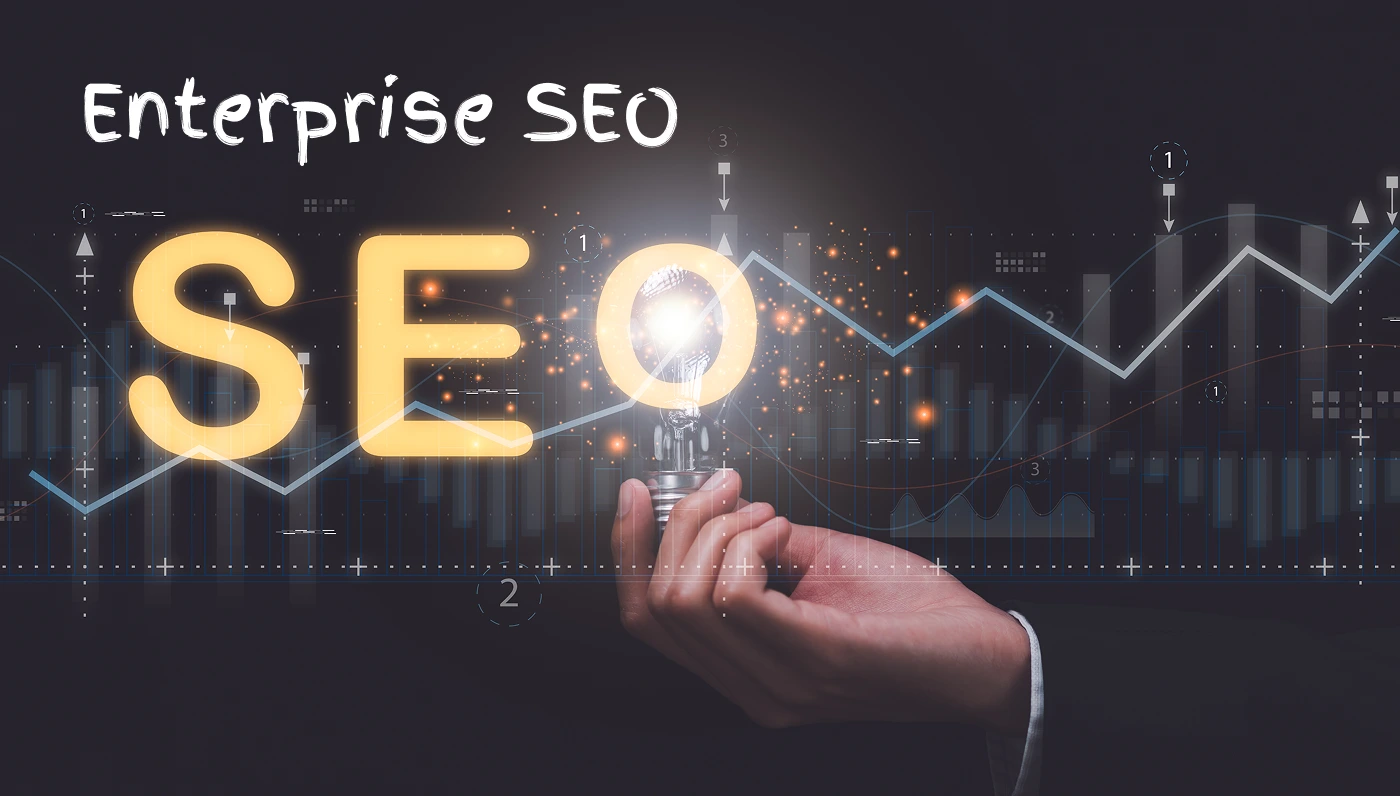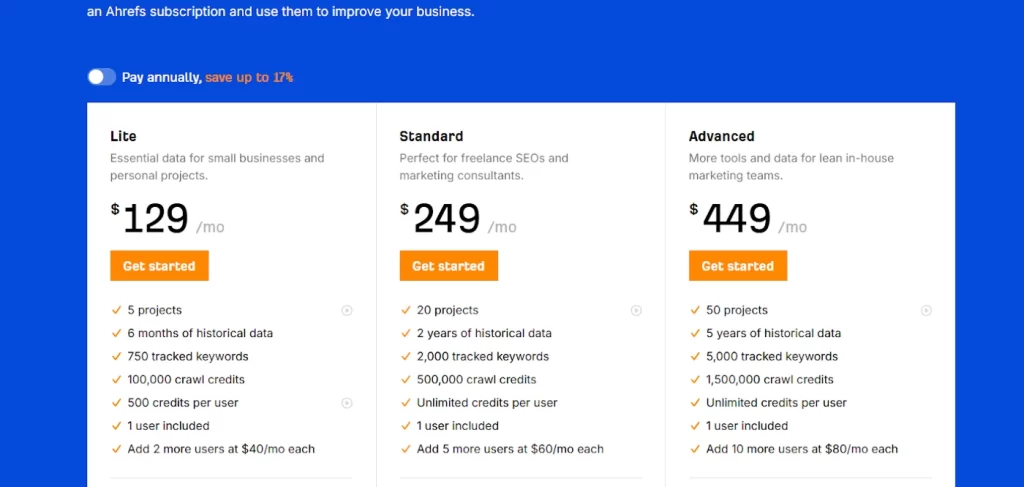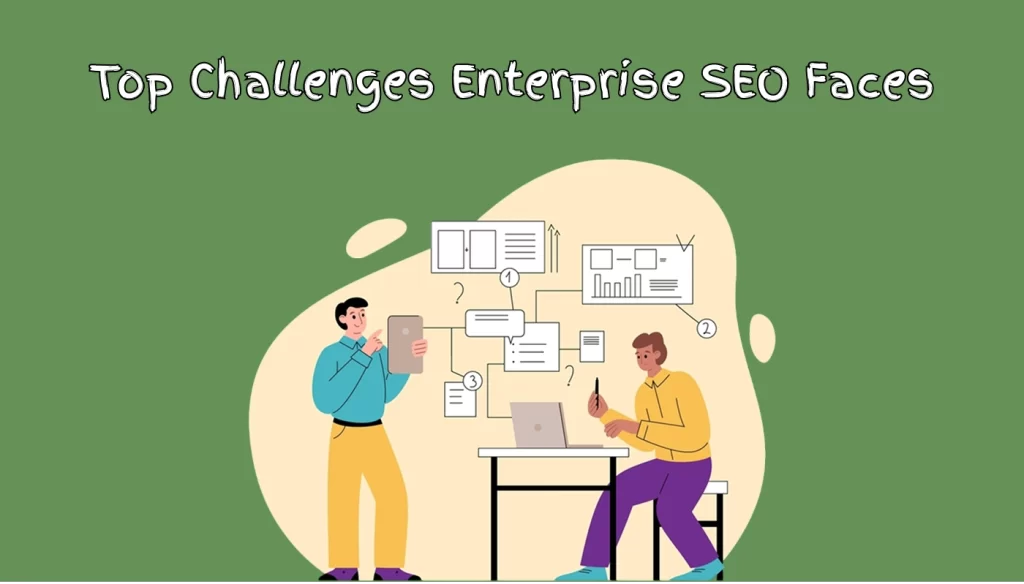Enterprise SEO Explained [+ Simple Tips & Key Challenges]

Have you ever wondered how massive companies like Microsoft or Amazon manage to stay at the top of search engine rankings despite having websites with thousands of pages? That’s where Enterprise SEO comes into play.
No matter the size of your company or its website (or in some cases, multiple websites), a solid SEO strategy can help get your content in front of the right audience.
Enterprise SEO, often known as corporate SEO, is intended to help major commercial enterprises.
But what exactly is it, why is it important, and what are the optimization challenges you need to tackle to take your company to the top of the search results?

What Is Enterprise SEO?
Enterprise SEO refers to advanced SEO strategies specifically designed for large, enterprise-level companies.
Enterprise SEO’s essential components include growing content generation, using automation, and managing ongoing technical SEO at scale.
Examples of businesses that typically require Enterprise SEO are companies with a global presence, like Amazon or Microsoft ( as discussed above), and large eCommerce brands such as Adidas or Nike, which have thousands of products and landing pages.
Any large organization with a complex or content-heavy website can benefit from Enterprise SEO.
It involves optimizing every page for better visibility while aligning SEO efforts with the company’s broader organizational goals.
The primary objective? To achieve higher search engine visibility and long-term growth.
The Core Pillars of Enterprise SEO:
- Technical SEO: From crawlability and indexing to site speed and mobile-friendliness – this is the foundation.
- Strategic Content Development: Creating scalable, optimized, and targeted content that aligns with user intent and brand voice.
- Link Development: Building a strong backlink profile to boost authority and drive consistent traffic.
But don’t get it twisted – Enterprise SEO isn’t just a “bigger” version of regular SEO. It comes with its own set of challenges: managing technical debt across large websites, streamlining collaboration across teams, maintaining consistency in content, and navigating shifting algorithms.
Still, for companies ready to dominate search in a big way, Enterprise SEO isn’t optional – it’s essential.
Ready to scale up? This might be your next big SEO leap.
How Enterprise SEO is Different From “Normal” SEO?
Scaling
Scalability is where Enterprise SEO excels compared to traditional SEO. While traditional SEO focuses on optimizing a limited number of pages, Enterprise SEO addresses hundreds or even thousands of pages, often across multiple subdomains or in different languages. It necessitates the use of automation, bulk changes, and structured workflows to implement strategies efficiently, ensuring that quality is maintained and no optimization opportunities are overlooked.
SEO Tools
Traditional SEO uses basic tools like keyword planners, backlink checkers, and rank trackers. Enterprise SEO, however, demands advanced tools for automation, content scaling, crawl budget management, and data integration, such as log file analyzers, API connectors, tag managers, and custom dashboard builders for cross-domain insights and reporting.
Stakeholder Collaboration
Enterprise SEO necessitates close collaboration among various departments, including marketing, product, IT, and content teams. For instance, if you want to make a page mobile-responsive, the UX team will redesign the layouts, developers will ensure the backend is responsive, content teams will focus on readability for smaller screens, and SEO specialists will test mobile speed and Core Web Vitals.
Keyword Choice
Thanks to the brand’s strong domain authority, enterprise SEO targets a broader and more competitive range of keywords. While traditional SEO focuses on niche or long-tail keywords, enterprise sites can aim for high-volume, industry-defining terms, expanding their visibility across multiple categories and reaching diverse segments of their target audience.
Different SEO Tools
Enterprise Businesses require enterprise-level tools.
Many advanced SEO tools are even simply made for enterprise SEO platforms.
Depending on the enterprise-level business you are working on, you might be able to work with a normal SEO tool and might go higher.
Ahrefs offers (No Follow link) powerful plans for different business sizes, but its Advanced plan at $449/month is built specifically for enterprises. It supports up to 50 projects, offers 5 years of historical data, 5,000 tracked keywords, and a massive 1.5 million crawl credits – perfect for large-scale SEO efforts.
While Lite and Standard plans cater to smaller teams, the Advanced tier gives big businesses the firepower they need to handle complex audits, deeper keyword analysis, and custom workflows.


Top Challenges Enterprise SEO Faces (With Simple Solutions)
When it comes to Enterprise SEO, the road to top rankings isn’t always smooth, especially with large-scale websites and multi-team operations in the mix. But that’s where we step in.
As your enterprise SEO partner, we don’t just identify hurdles – we solve them. Whether you’re struggling with site scalability, content silos, or coordination chaos, our tailored strategies are built to boost your ROI and keep things running like clockwork.
Below, we’ve listed the most common challenges large businesses face – and the actionable solutions we bring to the table to help you tackle them, step by step.
Streamlining Internal Links and Site Architecture
A well-organized internal linking structure and site architecture is crucial for building domain authority effectively. It’s not just about connecting pages – it’s about creating a scalable, SEO-focused ecosystem that enhances crawlability, distributes link equity, and improves user experience.
Tools like Screaming Frog, Semrush, and Ahrefs help identify broken links, orphaned pages, and architectural inefficiencies, offering actionable insights for improvement.
Solution
An ideal enterprise SEO platform should provide automated audits, prioritize high-impact link opportunities, and offer real-time visualizations of your site’s architecture, helping you scale smarter and faster.
Optimizing Multiple Pages
Optimizing thousands – or even millions – of web pages is overwhelming, especially when each one needs to stay up-to-date and aligned with ever-changing SEO standards.
Without regular audits, issues like duplicate content, broken links, or poor mobile experience often go unnoticed, leading to lower rankings and user dissatisfaction.
Solution
Use advanced SEO tools like Semrush Site Audit, Screaming Frog, or Lumar (Deepcrawl) to scan and detect large-scale issues. Pair these insights with a structured content workflow and a dedicated SEO team to streamline page updates, prioritize fixes, and maintain optimization at scale.
Implementing Content Strategies
Enterprise websites often struggle to keep content relevant, updated, and aligned with shifting industry trends. Outdated pages, missing topic coverage, and inconsistent messaging can weaken your authority and hurt rankings, especially across thousands of pages.
Solution
Develop a scalable content strategy focused on audience intent. Regularly update existing content, identify gaps using tools like Ahrefs Content Gap or Google Search Console, and create fresh pages based on trending industry topics. Establish a review cycle (quarterly or biannually) to keep everything aligned with SEO and user needs.
Sluggish Pace
Enterprise websites are notorious for their sluggish pace, and it’s often the biggest roadblock to SEO success. Layers of internal red tape, multiple approval processes, internal bureaucracy, and siloed departments mean even simple SEO updates can take weeks (or months) to go live.
This delay not only slows down performance but also leads to higher bounce rates and poor user experience due to unoptimized, bulky pages. When SEO tasks are constantly delayed or deprioritized, it becomes nearly impossible to hit KPIs.
Solution
To overcome sluggish pace, implement some innovative practices. Start by clearly communicating why you’re doing something and how it can create impact.
For instance, don’t just say “optimize mobile responsiveness.” Say, “We can drive an extra $500K in annual revenue with zero added cost.” Break large strategies into smaller, actionable sprints. This makes them easier to execute and track.
Start by collaborating closely with your team members – momentum builds when everyone understands the value behind the task.
Interpersonal Alignment
Success in enterprise SEO hinges on strong soft skills – often more than technical know-how. That’s because SEO teams must align with multiple departments and navigate internal politics.
Communication, persuasion, adaptability, and leadership are essential to pitch ideas, justify strategies, and build trust. Emotional intelligence helps you manage resistance, while problem-solving skills ensure quick, effective decisions.
In enterprise environments, it’s not just about knowing SEO – it’s about leading with it.
Solution
Invest in regular training sessions focused on soft skills like communication, collaboration, and leadership. Encourage cross-functional workshops to build empathy and teamwork. Empower your SEO team to present data-backed insights with confidence. The more polished their soft skills, the smoother the execution across departments and decision-makers.
Key Advantages Of Enterprise SEO
Reason #1 — You Dominate Visibility, Organically
With Enterprise SEO, you’re not just playing the game – you’re owning the field.
You rank for thousands of keywords across multiple pages without paying for every click.
Your brand becomes impossible to ignore.
It’s like putting up billboards across every highway – wherever your audience looks, there you are.
Reason #2 — You Scale Without Breaking a Sweat
With Enterprise SEO, scaling isn’t scary – it’s strategic.
You’re optimizing thousands of pages across markets, languages, and devices – all at once.
No manual chaos, just smart systems.
It’s like cloning your best-performing page a hundred times over – reaching more people, with less effort, and way more impact.
Reason #3 — Consistency Bringing Results
When you implement a standard SEO program across your company, you eliminate guesswork, even if content is being created in different regions.
A unified approach means consistent optimization, messaging, and structure.
And that kind of consistency doesn’t just look good – it delivers real, measurable results. Think better rankings, better traffic, and better performance across the board.
Reason #4 — Data That Drives Smarter Decisions
Advanced tools like Semrush Site Audit do more than spot errors – they deliver deep insights into performance metrics that truly impact your bottom line.
From bounce rates to mobile responsiveness, you get the full picture.
These insights help teams prioritize fixes, boost user experience, and improve conversion rates – all with data-backed confidence.
Reason #5 – Risk Management
Enterprise SEO demands careful planning and large-scale testing to spot potential risks before they get compounded.
By identifying issues early – like broken links, site errors, or outdated content – you can prevent broader disruptions.
It’s like catching a crack before it becomes a landslide. Proactive testing keeps your SEO ecosystem steady and secure.
Design A Winning Enterprise SEO Strategy
At SEOBookLab, we’re equipped to craft winning enterprise-level SEO strategies – from in-depth keyword research and technical site structure to scalable content systems that drive massive visibility on Google. With the right approach, your organization can unlock SEO’s full potential and stay ahead of the competition.
Book a free strategy session to see how we can help elevate your brand and drive results.

